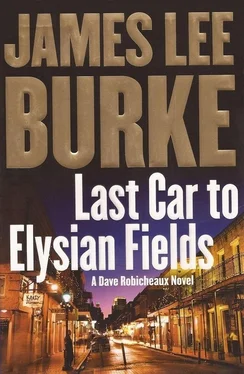“What are you talking about?”
“These anti-abortion nutcases. They take pictures of women going into abortion clinics, then put the pictures and the women’s names and addresses on the Internet. Father Dolan spoke up about it, a Catholic priest. How many enemies does one guy need?”
“Our time is about up, Gunner,” I said.
“The queer-bait from the Quarter was supposed to scare Father Dolan, not go ape shit with a pipe. Hey, are you listening? It’s on the street I snitched off Sammy Fig. You must have given up my name to Fat Sammy.”
“Sammy says he never heard of you. You shouldn’t have anything to worry about.”
“I knew it.” His face turned gray. He wiped his mouth and looked at the trusty gardener clipping a hedge outside the window. “Why you staring at me like that?” he said.
“I think you’re using the seal of the confessional to keep Father Dolan from testifying against you.”
“Maybe that was true at first. But I’m still sorry for what I done.
He’s a good guy. He didn’t deserve what happened to him.”
I glanced at my watch. “We’re done here. So long, Gunner,” I said.
He rose from his chair and walked to the door, then stopped, his shoulders slightly stooped, his impish features waiting in anticipation, as though an act of mercy might still be extended to him.
“What is it?” I said.
“Call Sammy Fig. Tell him I didn’t rat him out.”
“What’s Ray’s last name?” I asked.
“I don’t know.”
“ Adios ,” I said.
I went back to reading my morning mail. When I looked up again, he was gone. A moment later Father Jimmie stuck his head in the door, his disappointment obvious.
“You couldn’t help Phil out?” he asked.
The next day I called the warden’s office at Angola Penitentiary and asked an administrative assistant to do a records search under the name of Clarence “Junior” Crudup.
“When was he here?” the assistant asked.
“In the forties or fifties.”
“Our records don’t go back that far. You’ll have to go through Baton Rouge for that.”
“This guy went in but didn’t come out.”
“Say again?”
“He was never released. No one knows what happened to him.”
“Try Point Lookout.”
“The cemetery?”
“Nobody gets lost in here. They either go out through the front gate or they get planted in the gum trees.”
“How about under the levee?”
He hung up on me.
At noon I walked past the whitewashed and crumbling brick crypts in St. Peter’s Cemetery to Main Street and ate lunch at Victor’s Cafeteria, then returned to the office just as the sun went behind a bank of thunderheads and the wind came up hard in the south and began blowing the trees along the train tracks. There were two telephone messages from Theodosha Flannigan in my mailbox. I dropped them both in the dispatcher’s wastebasket.
At 4:00 P.M.” in the middle of a downpour, I saw her black Lexus pull to the curb in front of the courthouse. She popped open an umbrella and raced for the front of the building, water splashing on her calves and the bottom of her pink skirt.
I went out into the corridor to meet her, feigning a confidence that masked my desire to avoid seeing her again.
“Did you get my invitation?” she said, her face and hair bright with rain.
“Yes, thanks for sending it,” I replied.
“I called earlier. A couple of times.”
Two deputies at the water cooler were looking at us, their eyes traveling the length of her figure.
“Come on in the office, Theo. It’s been a little busy today,” I said.
I closed the door behind us. “If you can’t come Saturday, I understand. I need to talk to you about something else, though,” she said.
“Oh?”
“I’ve got a problem. It comes in bottles. Not just booze. Six months ago I started using again. My psychiatrist gave me the keys to the candy store,” she said.
Her voice was wired, the whites of her eyes threaded with tiny veins.
She let out a breath in a ragged sigh. Her breath smelled like whiskey and mint leaves, and not from the previous night. “Can I sit down?” she asked.
“Yes, I’m sorry. Please,” I said, and looked over my shoulder at Helen Soileau passing in the corridor.
“Dave, I have little men with drills and saws working in my head all day. Sometimes in the middle of the night, too,” Theodosha said.
“There’s a meeting tonight at Solomon House, across from old New Iberia High,” I said.
“I’ve been in treatment twice. I was in analysis for seven years. I get a year of sobriety, then things start happening in my head again.
My most recent psychiatrist shot himself last week. In Lafayette, in Girard Park, while his kids were playing on the swings. I keep thinking I had something to do with it.”
“Where’s Merchie in all this?”
“He makes excuses for me. He doesn’t complain. I couldn’t ask for more. You know, he’s not entirely normal himself.” She took a handkerchief from her purse and blotted the moisture from her eyes. “I don’t know what I’m doing here. Merchie’s bothered because you think he’s dumping oil waste around poor people’s homes. He looks up to you. Can’t you come out to Fox Run Saturday?”
“I’m kind of jammed up these days.”
“How long were you drunk?”
“Fifteen years, more or less.”
“You didn’t want to drink when your wife died?”
“No,” I said, my eyes leaving hers.
“I don’t know how anybody stays sober. I feel dirty all over.”
“Why?”
“Who cares? Some people are born messed up,” she said. “I’m sorry for coming in here like this. I’m going to find a dark, hermetically sealed, air-conditioned lounge and dissolve myself inside a vodka collins.”
“Some people just ride out the hangover. Today can be the first inning in a new ballgame.”
“Good try,” she said, rising from her chair.
I thought she was about to leave. Instead, she fixed her gaze on me, waiting. Her hair had the black-purplish sheen of silk, the tips damp and curled around her throat.
“Is there something else?” I asked.
“What about Saturday?” Her face softened as she waited for an answer.
That evening, at twilight, a Buick carrying three teenage girls roared around a curve on Loreauville Road, passed a truck, caromed off a roadside mailbox, then righted itself and slowed behind a school bus as someone in the backseat flung a box of fast-food trash and plastic cups and straws out the window. The truck driver, a religious man who kept a holy medal suspended from a tiny chain on his rearview mirror, would say later he thought the girls had settled down and would probably follow the church bus at a reasonable speed into Loreauville, five miles up Bayou Teche.
Instead, the driver crossed the double-yellow stripe again, into oncoming traffic, then tried to cut in front of the church bus when she realized safe harbor would never again be hers.
Helen Soileau, four uniformed deputies, two ambulances, and a firetruck were already at the accident scene when I arrived. The girls were still inside the Buick. The telephone pole they had hit was cut in half at the base and the downed wires were hanging in an oak tree. The Buick had slid on its roof farther down the embankment, splintering a white fence before coming to rest by the side of a fish pond, where the gas tank had exploded and burned with heat so intense the water in the pond boiled.
“You run the tag yet?” I said.
“It’s registered to a physician in Loreauville. The baby-sitter says he and his wife are playing golf. I left a message at the country club,” Helen said.
Читать дальше












